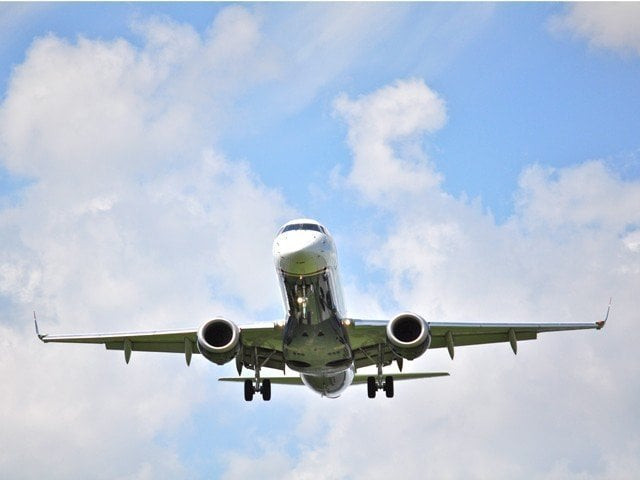Excise duty: FED challenges growth and development objectives
Makes air travel very expensive, restricts the process of documentation

Makes air travel very expensive, restricts the process of documentation
PHOTO:FILE
It certainly makes air travel very expensive considering the current position of socio-economic development in the country. Very few Pakistanis and economists have questioned the imposition of such a high FED on air travel that has hurt the aviation sector.
Indeed, aviation is not the only sector that is suffering due to the FED. Other sectors include cement, banking, imports, marketing, telecommunications and business outsourcing.
Tax Refunds Claims: ‘FBR should provide relief to exporters’
Earlier this month, leading young economist Dr Vaqar Ahmed shared in the Karachi Literature Festival that Pakistan has 56 taxes and 13 different tax agencies. In this scenario, it should not be a surprise that Pakistan’s ranking in the paying taxes indicator in the Ease of Doing Business Report 2018 is 172 among 190 economies of the world.
With such a worst performance in terms of facilitating taxpayers, how can we expect more tax collection and private sector development?
Indeed, there are many issues confronting the tax system in Pakistan, but we will focus only on FED in this article.
Loopholes
Excise duty is supposed to be imposed on manufacturing, sales and the use of products that are to be discouraged or if the use of those products is harmful for human health, such as cigarettes or alcohol.
In addition, governments may impose excise duty on some imports to provide benefit for domestic manufacturers in comparison to importers. FED on any product/service pushes up its price and discourages its consumption.
A look at current practices pertaining to FED shows various loopholes that need the attention of policymakers. FED is based on the Federal Excise Act 2005 that was passed almost five years before the 18th Constitution Amendment after which provinces also levied different types of taxes.
They have imposed 16% FED on banking services, advertisements on cable TV network, vegetable ghee, cooking oil and chartered flights.
Apart from this, Rs1.25-per-kg FED has been imposed on Portland cement, aluminous cement, slag cement, super sulphate cement and similar hydraulic cement, whether or not coloured or in the form of clinkers.
FED at the rate of Rs17.18 has been imposed on every hundred cubic metres of liquefied natural gas (LNG). On telecommunication and franchise services, 17% and 10% in FED are collected respectively.
FED share in overall taxes
Some may argue that the FED adds to the collection of tax revenues. Actually, it only contributes around 5% to the total federal tax revenues.
Its abolition from air travel, essential banking services and cement will enhance the market of these sectors, which will, in turn, help the government to collect more taxes besides achieving many socio-economic objectives.
It is believed that the FED is only imposed on the products that are harmful for human health or when there is an economic or moral rationale to discourage the consumption of a product or service. That’s not true.
FED on cement, air travel, LNG and vegetable ghee and cooking oil negates the very objectives of economic growth and development.
Under the China-Pakistan Economic Corridor (CPEC), for example, extensive construction work is going on where cement is one of the key ingredients.
Similarly, Pakistan needs to promote the construction industry to create jobs and provide housing and other essential infrastructure for the rapidly growing population. FED, we think, is discouraging the achievement of such goals.
Reforming tax structure should be priority
One of the key objectives of the aviation policy, for example, is to incentivise the aviation sector for socio-economic growth. Conversely, the FED on airfare is restricting air travel by the people. Air travel is not the luxury anymore.
In Pakistan, air travel is not common as high taxes make it unaffordable for the majority of population who want to reach their destinations quickly to meet their social and financial needs. Pakistan needs to facilitate domestic travel to connect people and places with each other.
FED on some banking services is also against the very motive of the government to enhance documentation of the economy. On the one hand, Pakistan wants to improve access to finance and inclusiveness in the financial sector and on the other it imposes FED on some banking services.
Naveed Iftikhar is a public policy adviser and research fellow having interest in public-sector governance, cities and entrepreneurship
Khawer Hayat Cheema is a management and development professional working for both corporate and development sectors
Published in The Express Tribune, February 26th, 2018.
Like Business on Facebook, follow @TribuneBiz on Twitter to stay informed and join in the conversation.











1724319076-0/Untitled-design-(5)1724319076-0-208x130.webp)






COMMENTS
Comments are moderated and generally will be posted if they are on-topic and not abusive.
For more information, please see our Comments FAQ